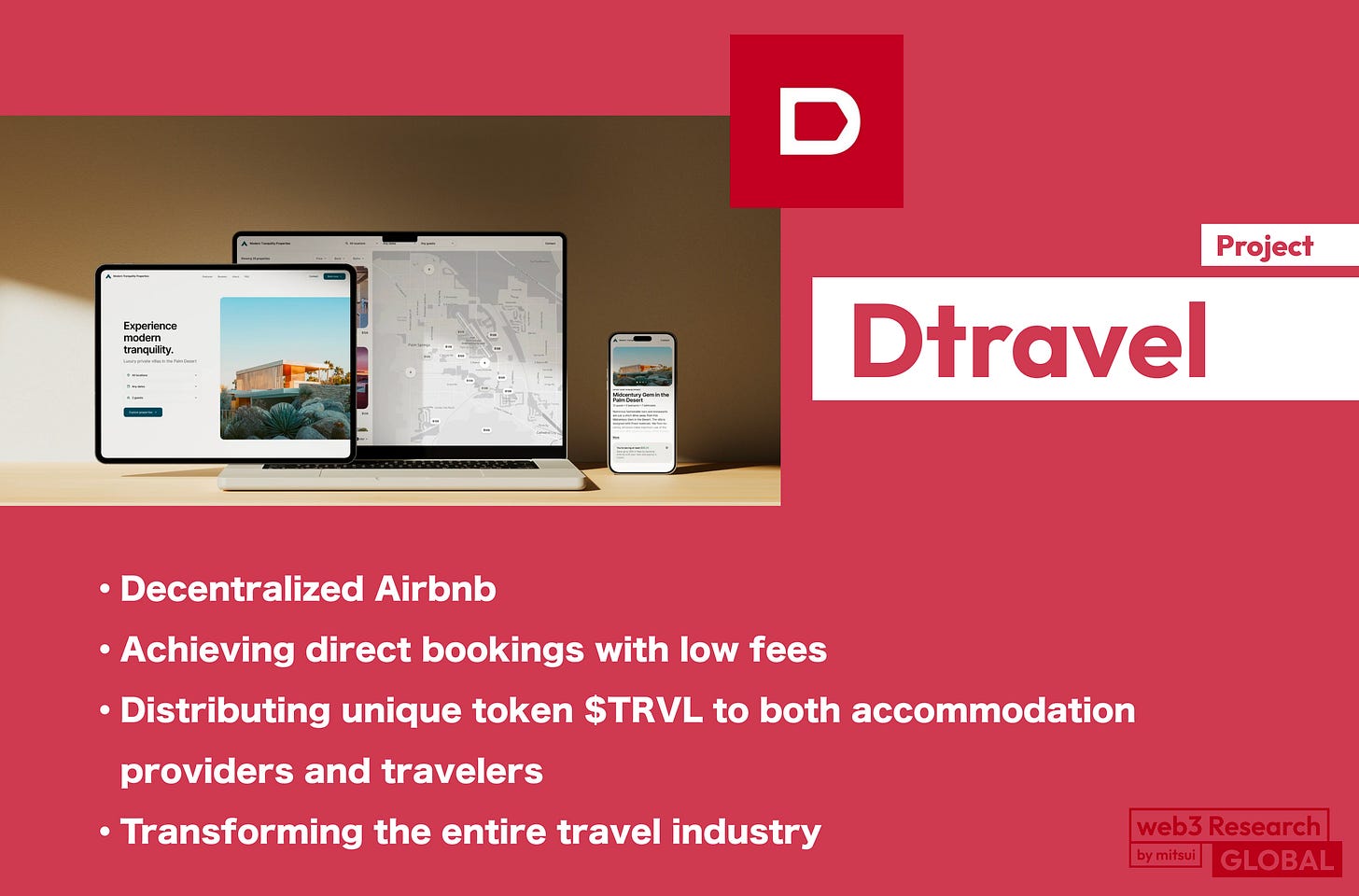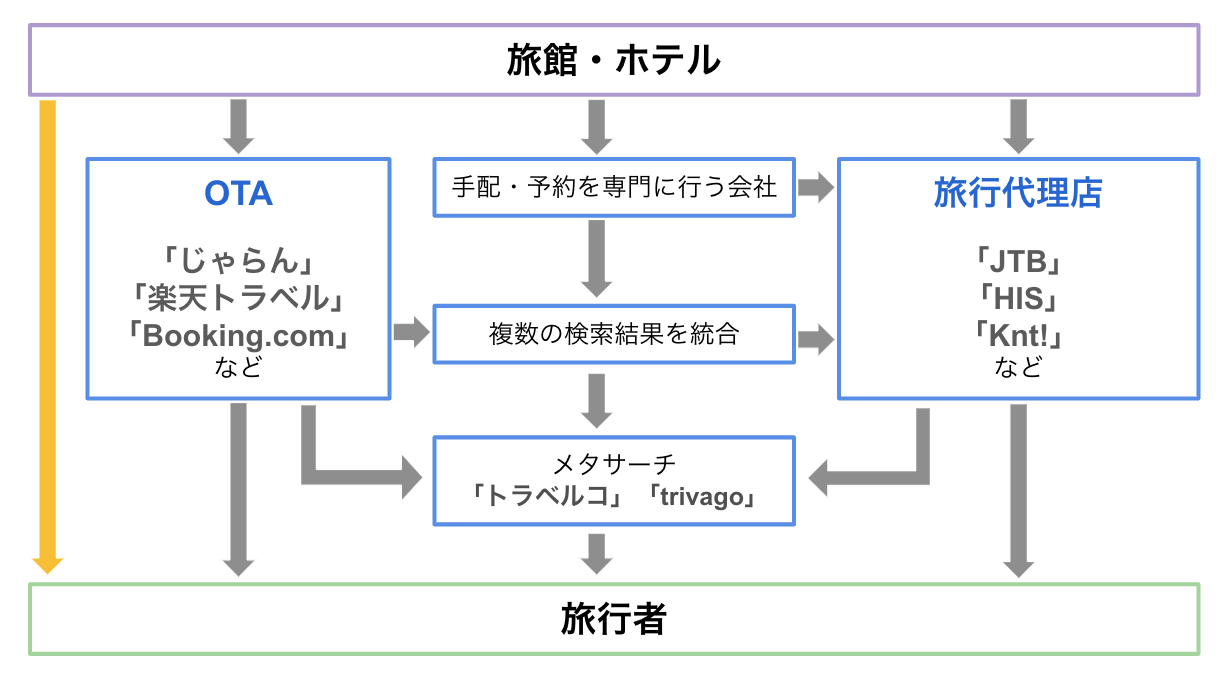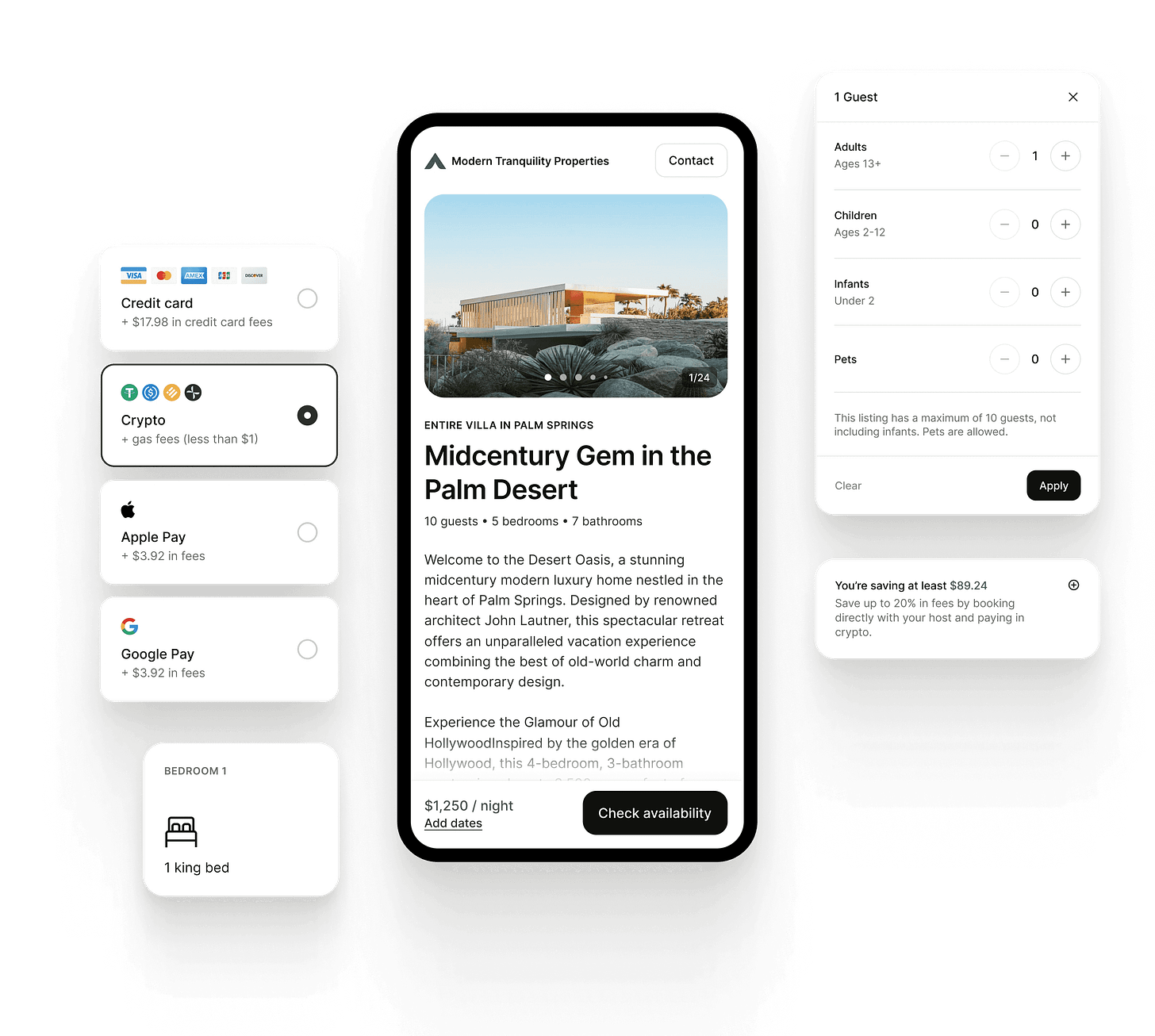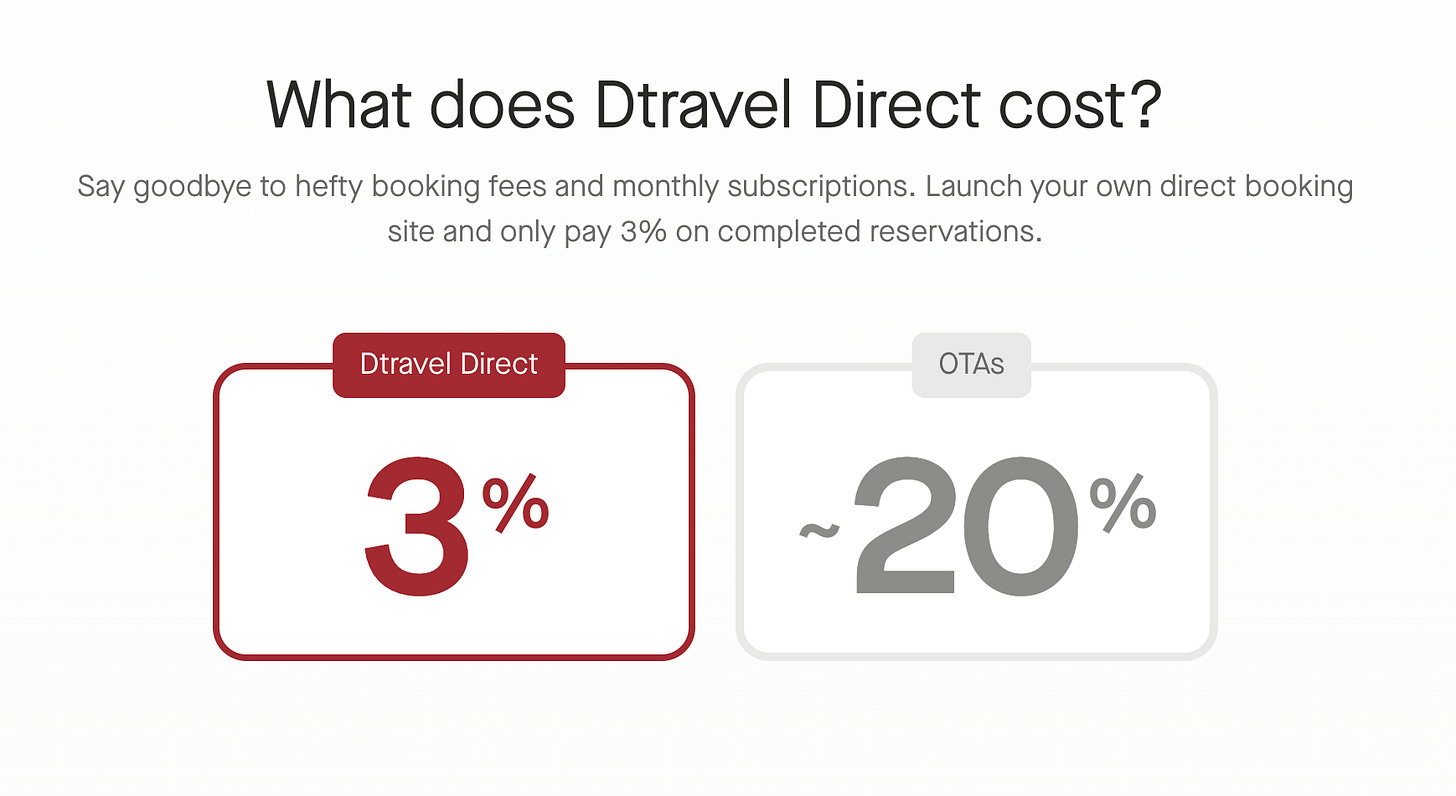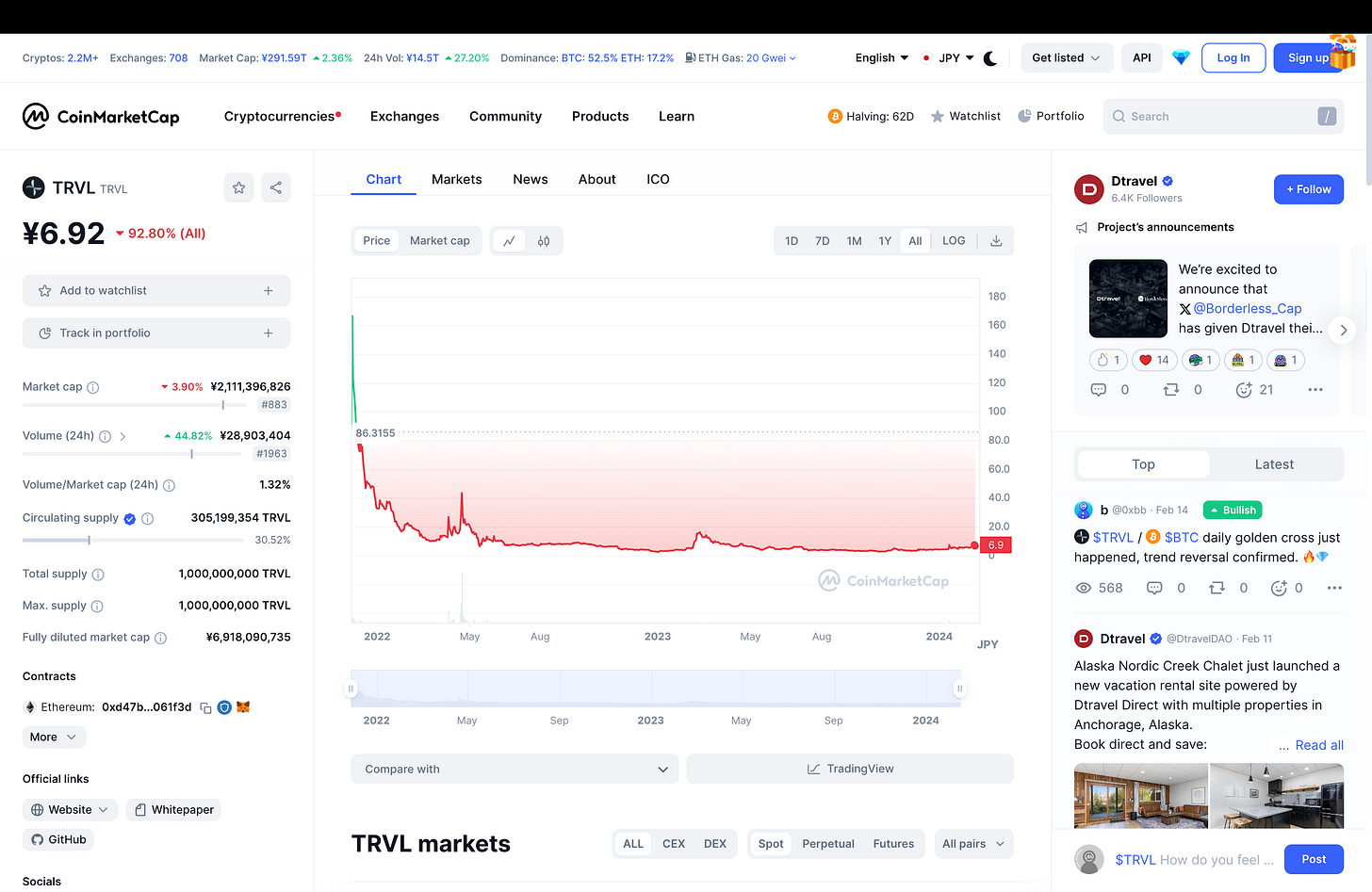【Dtravel】Decentralized Airbnb / Achieving direct bookings with low fees / Distributing unique token $TRVL to both accommodation providers and travelers / Transforming the entire travel industry
"Dtravel" is a decentralized travel booking platform.
Good morning.
I am Mitsui, a web3 researcher.
Today, I researched about "Dtravel".
«Table of Contents»
1, Overview|What is Dtravel?
-Current situation of the travel industry
-Features
2, Tokenomics|Distributing the unique token $TRVL to both accommodation providers and travelers
3, Evolution and Outlook|A challenge to transform the entire travel industry in four phases
4, Consideration|The least substituted company in web3 and GAFA that replaces Web2
Overview|What is Dtravel?
"Dtravel" is a decentralized travel booking platform. It might be easier to understand if you think of it as a decentralized Airbnb. It allows accommodation providers to accept bookings directly from customers and enables reservations and payments online with low fees.
■Current situation of the travel industry
Currently, the travel industry is generally booked through travel sites and travel agencies called OTAs. OTA stands for Online Travel Agent, which refers to travel companies that trade on the internet.
Until now, direct bookings on accommodation websites were the norm, but with the development of the internet, the presence of Online Travel Agencies (OTAs) has increased. Depending on the site, the OTA's commission is about 20%, which leads to a squeeze on the profits of inns and hotels and an increase in the price paid by travelers.
This system is the same structure as "selling directly on your own site" or "listing on marketplaces like Amazon" on e-commerce sites. Selling on your own site has a higher profit margin and you can manage customer data, but you have to attract 100% of customers by yourself. On the other hand, marketplaces charge a commission, but they support operations such as attracting customers and delivery.
In the travel industry, this structure was established between direct bookings and OTAs.
However, just as more companies are selling directly through D2C on e-commerce sites, more companies in the travel industry are making direct bookings instead of through OTAs. The reasons for this include the ease of attracting customers on your own due to the spread of social media, and the increasing difficulty of not having contact points and customer data.
The platform that realizes direct bookings in the travel industry in a decentralized manner is Dtravel.
■Features
○For accommodation providers
You can build your own direct booking site with no code. You can either build a dedicated site or place a booking function as a widget on your own website.
We have implemented a booking experience with the same UX as existing OTAs, and we also support payment in cryptocurrency.
The fee is 3%, which is significantly cheaper than existing OTAs. By utilizing blockchain and smart contracts, we have been able to achieve low fees.
This accommodation provider was focusing more on short-term rental guests than one-night hotel guests.
○ Travelers
While travelers can stay at the hotel they are interested in, they are issued an NFT called 'Dtravel Meridian' as an accommodation benefit. This is an NFT given to guests with their travel history and reputation engraved. As it contains their reputation and preferences, sharing it when traveling in the future will allow them to enjoy more personal benefits.
At present, it is operated in a closed beta version, but as the spread of this "Dtravel Meridian" progresses, it will become the on-chain reputation history (Travel DID) of travelers, accelerating the realization of a decentralized travel booking platform.
Tokenomics | Distributing the proprietary token $TRVL to both accommodation providers and travelers
Dtravel has issued its own token, $TRVL. Both accommodation providers and travelers can acquire this $TRVL, which allows access to valuable benefits and participation in governance.
The following were listed as utilities on the HP:
Operator Rewards: Accommodation operators earn TRVL for each reservation completed using Dtravel Direct to offset fees
Traveler Rewards: Travelers earn TRVL by collecting travel proof stamps and sharing guides and itineraries with the community
Staykey: Travelers can stake TRVL to earn a stay key for stays via Dtravel Direct
Access to features: TRVL functions as a membership token, unlocking features by staking
Payments: Short-term rental operators can enable TRVL as a payment option for reservations
Gas fees: TRVL covers the transaction fees when the smart wallet interacts with the Dtravel protocol
Operator discounts: Telecommunication operators can offset fees with higher reward payments when accepting TRVL
Traveler discounts: Travelers can receive discounts on reservations when paying with TRVL
Access to data: By staking TRVL, travel partners can access reservation data and execute queries
Governance: Can participate in the submission and voting of proposals for ecosystem improvements
etc..
Although there are still many features that have not been realized, by using DTravel in this way, TRVL accumulates and becomes more advantageous to hold.
The total supply is 1B, with the following allocation. The token has been issued on Ethereum and BNB.
The token price has fallen since its release, but considering that the time of release was a bubble and the platform itself is still in beta, I think this is a token for the future. CEX has listed on ByBit, KuCoin, Gate, and MEXC.
Transition and Outlook | The Challenge to Transform the Entire Travel Industry in Four Phases
Dtravel is released by the operating company of Travala, a crypto payment-enabled travel booking site supported by Binance. Established in 2017, Travala has become one of the world's leading platforms as a crypto booking site, offering the largest travel products in the world, including more than 2,200,000 accommodation facilities across 230 countries and regions, over 600 airlines, and more than 410,000 activities.
The team announced the release of the Dtravel platform in June 2021, and started its initial version in November 2021.
As of February 2024, Dtravel still has many parts in closed beta, and looking at its roadmap, it is clear that it aims not only to be a decentralized travel booking site, but also to build an ecosystem that transforms the entire travel industry.
The following four phases were posted on the HP. For the details of the actions planned in each phase, please refer to the HP, but here we will introduce the big story.
Peer-to-Peer Bookings: To reduce dependence on OTAs, we will establish a system that enables direct reservations through Dtravel Direct.
Open Standard Protocol: We will establish an open standard protocol for the private lodging industry, called Nite Protocol, to standardize private lodging data and eliminate inefficiencies and unnecessary costs across the industry.
Decentralized Discoverability: We will build a discovery portal called Dtravel Stays for travelers, using AI and other technologies to enable consumers to freely search and book direct reservation sites around the world without intermediaries.
On-Chain Reputation: We will improve the experience through on-chain history, where travelers can enjoy personal experiences and receive tokens through a travel history NFT called Dtravel Meridian.
Building a platform from scratch is difficult, so we will start with a tool that allows individual companies to build their own reservation sites, evolve into a protocol (horizontal expansion of the system), contribute to discoverability like a platform, and finally, plan to provide benefits to users based on accumulated user data.
This process makes a lot of sense, and with the presence of tokens supporting it, the flow of gradually decentralizing may give you a sense of getting economic returns while looking at the creation of a global platform from a Web2 company.
It's still in phase 1, but I'm looking forward to the development of this future platform.
Observation | The most irreplaceable company among the web3 that substitutes Web2 and GAFA
Finally, let's discuss.
Dtravel is a simple service. To be frank, travelers don't really care about whether it uses blockchain technology (although it does accept crypto payments). They just use it to book accommodations that they are interested in.
Currently, I think it is mostly used by crypto natives, but eventually, I think people who are unaware of or indifferent to crypto will start using it. I feel that the state of blockchain being used only as a backend infrastructure is exactly like this.
There are distributions of $TRVL tokens to travelers, but there are also point distributions on existing travel sites, so the online booking experience is no different from the existing one if you perceive it in that sense.
It's hard to express, but looking at Dtravel and the previously researched restaurant reservation platform Blackbird, web3 projects are finally being born to replace the mega platforms and ecosystems of Web2.
Of course, all services are substitutes for existing ones, so DeFi like Uniswap is also connected to the replacement of the existing financial system, but there is still a large aspect of problem-solving due to the creation of a new industry called crypto. The money flowing into it is a substitute for something, but the project itself is a solution to problems caused by a new industry.
On the other hand, Dtravel is a complete substitute for Airbnb and existing OTAs. And it doesn't stop at being just one platform, it is trying to manage the reputation of travelers and accommodation providers on-chain by creating a common reservation system, a common currency (token), and the foundation of the travel industry. And in the end, it plans to transition completely to a DAO.
This would have a significant impact if realized. Airbnb's current market capitalization is about $95 billion, which would be about 14-15 trillion yen when converted into yen. Of course, private lodging and travel reservations are not only made through Airbnb, so it is an initiative to replace a market of several hundred trillion with a decentralized system.
I don't think it's a half-hearted journey, but the birth of web3 projects to replace existing Web2 mega platforms in the midst of at least the minimum technical preparations is likely to be a big step towards the mass adoption of web3.
Often in questions to startups, you hear, "What will you do if a major company imitates you?" but it's hard for a large company to imitate web3 measures. There is also the risk of token issuance, but it would greatly reduce the fees, so most of the existing sales would be blown away.
And to be more frank, even if the advantages of web3 projects disappear because a large company completely imitates them, from the consumer's perspective, a world where fees are lower will be realized, and it can be said that it is a merit that a world where blockchain is used on the back end is realized.
In the world of finance, DeFi is booming, but centralized financial institutions are also actively experimenting with blockchain, so in the future, credit card fees and international transfer fees will also decrease in centralized services. This is adaptation to the era of blockchain proliferation, and it's a happy thing for consumers to be able to enjoy a better UX.
I digressed a bit.
So, I don't know what GAFA, the representative of the existing mega tech companies, will be like 10 years from now, as they are being targeted for a decentralized war. There are decentralized SNSs, search browsers, and even decentralized AIs. Smartphones are still different in scale, but the Solana phone has been a topic of discussion.
In that sense, I still feel that Amazon is the strongest. Although it is possible to build a decentralized EC marketplace like Dtravel, in the case of EC (merchandising), delivery becomes very important, and I can't imagine that Amazon, which holds the logistics, can be replaced online only. I think DePIN is trying to replace such social infrastructure,
Amazon not only has simple deliveries but also owns factory facilities and keeps them constantly updated, so I feel it is difficult to replace that with a decentralized system alone. Amazon is amazing.
The discussion has expanded, and the story of crypto, which is only used by a small number of people, challenging mega tech companies like GAFA may not seem realistic, but in a world where the market leader can easily change in 10 years, I think it's quite possible. As someone involved in web3, I will continue to research its history!
That's all for the "Dtravel" research!
Disclaimer:I carefully examine and write the information that I research, but since it is personally operated and there are many parts with English sources, there may be some paraphrasing or incorrect information. Please understand. Also, there may be introductions of Dapps, NFTs, and tokens in the articles, but there is absolutely no solicitation purpose. Please purchase and use them at your own risk.
About us
A web3 newsletter delivered in five languages around the world. We deliver various articles about web3, including project explanations, news and trend analysis, and industry reports, every day. You can subscribe for $8 per month ($80 per year) and receive research articles that took 100 hours to complete every day.
Author
mitsui
A web3 researcher. Operating the newsletter "web3 Research" delivered in five languages around the world.
Contact
The author is a web3 researcher based in Japan. If you have a project that is interested in expanding to Japan, please contact the following:
Telegram:@mitsui0x
*Please note that this newsletter translates articles that are originally in Japanese. There may be translation mistakes such as mistranslations or paraphrasing, so please understand in advance.



